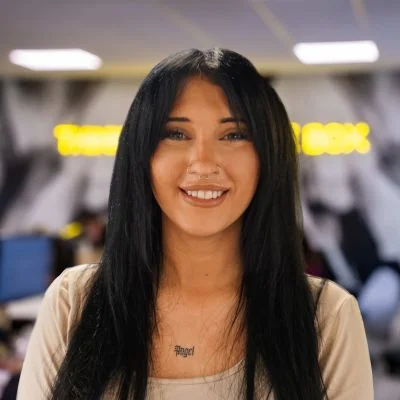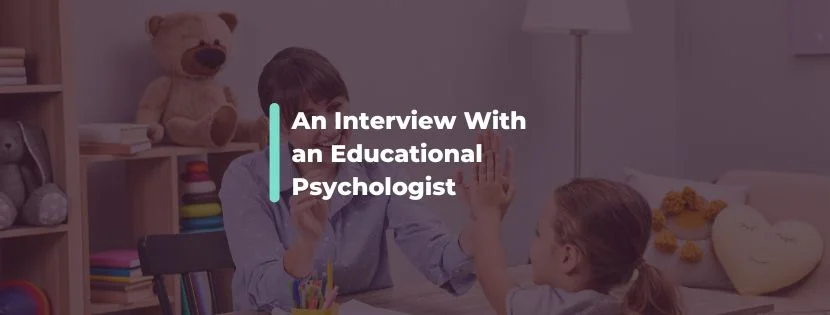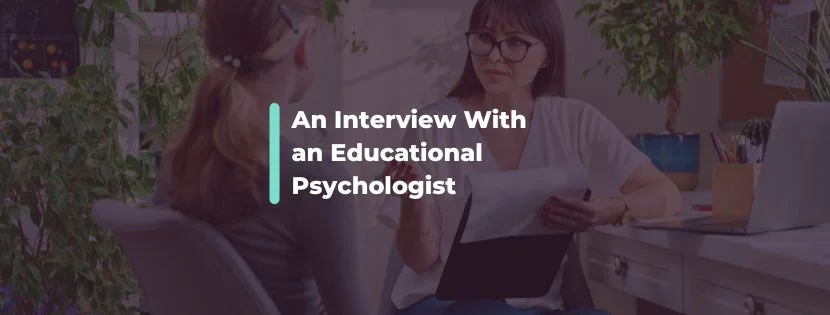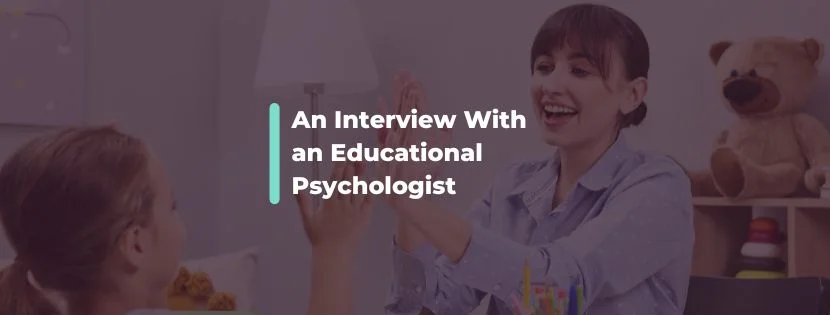The Path To Educational Psychology: Insights From a Trainee's Experience
11 Sept, 20241-2 minutes
In this blog, you will learn:
- The trials and tribulations of studying to become an Educational Psychologist.
- Tips for anyone considering a career in educational psychology
- How to find and apply for the best Educational Psychologist jobs.
Are you considering a career as an Educational Psychologist? Not sure where to start or what the studying process is like? Then look no further. Trainee Educational Psychologists are required to complete a 3-year postgraduate training programme which includes a doctorate qualification. Their education and training includes practice-based placement alongside their studies.
In this exclusive interview with a Trainee Educational Psychologist, we uncover what it’s like to study educational psychology and the steps to become fully qualified.
This Trainee Educational Psychologist is currently in her second year of studying her Applied Educational Psychology Doctorate, and has worked as an Assistant Educational Psychologist. She is passionate about re-engaging young people and ensuring that schools facilitate and meet the needs of young people.
Throughout this interview, you’ll discover the rewards and challenges of studying educational psychology and the best advice for those considering embarking on a career as an Educational Psychologist.
Tell me about your career journey so far
I completed my undergraduate degree in psychology in 2014 and knew I wanted to go into professional psychology. My original plan was to get experience working with a range of client groups to decide which path to take.
After working for a year supporting individuals with high-level spinal cord injuries, I got a position working as a Teaching Assistant in a specialist school. The range of needs within the school was staggering but working so closely to support these incredible young people made me realise that educational psychology was the route for me.
Working in a specialist school, I felt a powerful draw towards helping children and young people and their families. I also worked as a Personal Assistant for a young man with quite complex needs, taking him out and about and sometimes for weekends away.
Alongside these roles, I decided to bridge the gap academia-wise by undertaking a part-time master’s degree in the Psychology of Education.
Upon completing this, I had the confidence to apply for Assistant Educational Psychologist posts. I must have had around half a dozen interviews before I was finally offered one, so it took some resilience and engagement with feedback.
This role allowed me to broaden my understanding of the role of an Educational Psychologist and helped me to make a decent application to the Doctorate. It’s a gruelling process, I’ll admit, and I was fortunate to be offered a place on my first application. There are, however, many people on my course who applied multiple times so don’t lose hope!
You're currently in your second year training to become an Educational Psychologist, how is your studying going?
It’s intense! It’s a full-time commitment and very different to any other form of study. It’s really changed my thinking about… well, everything! There’s a huge emphasis on criticality, which has you questioning everything but also equips you with the tools to inspire real positive change for individuals, groups, and organisations. I draw upon a great deal of strength and support from my fellow trainees.
What is a typical study day like for yourself?
Courses at different universities differ but, generally, the first year is spent in university with shorter placements within a local authority educational psychology service.
I’m looking forward to being on placement more and having increased autonomy and responsibility in the second and third years. I’ll have my own set of schools to work with as well as conducting my own doctoral research.
What does your work consist of/require?
It is quite varied. There’s a significant statutory duty to contribute psychological advice to support applications for Education, Health, and Care Plans (EHCPs). Other roles are often down to negotiating with individual schools how they want to use their allocated Education Psychologists time.
This involves a variety of activities from staff training and individual casework, to larger-scale project work. As Trainee Educational Psychologists, we work at individual, groups and systems levels.
What is the most challenging part of your educational psychology training?
It’s definitely about managing competing demands and responsibilities. You have to balance the academic side, such as assignments and your thesis, with your professional development and working within a functioning educational psychology service.
At times, this can be a struggle on top of trying to have a life outside of the training. It’s a giant learning curve in time management, managing your own wellbeing, and doing the best you can with the resources you have at the time. The support from fellow Trainee Educational Psychologists, tutors, and supervisors is phenomenal, though – a hugely vital resource!
What is the best thing about training to become an Educational Psychologist?
It’s not one of those jobs where you often get to see any immediate positive impact of your work. However, it’s the ability to form positive relationships with young people, school representatives, families, and other professionals. The variety of work is also very appealing to me. No two days are the same!
Why do you think Educational Psychologists are in such high demand?
The doctoral training is intense and covers a wide array of developmental and child psychology, incorporating both theory and practice, as well as a key focus on criticality. I believe that this places Educational Psychologists in an ideal position to support schools across multiple levels.
The traditional role of the Educational Psychologist in providing individuals psychometric assessments barely scratches the surface of their skillset and potential to enact positive change for all stakeholders in education.
What do you feel can be done to support pupils with SEND in the classroom?
I think the most important thing is having a clear understanding of a pupil’s individual needs. There are a lot of helpful whole-class strategies as well, however, meeting the needs of pupils really begins with a deep understanding of what those needs are.
I understand that in the current context of our education system, this is often really tricky for school staff so it also involves adequately supporting the adults around a pupil.
Do you have any tips or advice for anyone else considering a career in educational psychology?
Don’t give up! It can feel like a gruelling journey to get there at times but, if it’s what you really want, then it’s absolutely worth it! It can also seem like a very elusive community but reaching out to current trainees and qualified Educational Psychologists can be really beneficial.
There are groups on social media full of wonderful people who would happily have a chat about their work and their individual journey to being an Educational Psychologist.
Widening participation is also a key concern for many Educational Psychologists in terms of disadvantaged groups. We work with individuals from all walks of life so representation is a vital aspect of educational psychology practice and research. Don’t be afraid to ask around and get in touch.
What are your plans for the future?
Right now, I’m focused on getting through the rest of my training. At this point, I’m learning about so many different avenues of individual interest and projects that would have never crossed my mind.
I’m not really ready to tie myself down to any one particular path as I’m still developing my interests. However, I know plenty of Trainee Educational Psychologists with a very clear path for their future career, something I also admire!
Educational Psychologist jobs
If you’re searching for your next Educational Psychologist job, why not take a look at the latest vacancies, or simply upload your CV to be notified when a relevant position becomes available.
Learn the ropes and check out more of our interviews with Educational Psychologists from Assistant, to Senior to Principal Educational Psychologist.
Struggling to recruit Educational Psychologists?
As specialist local authority SEND recruiters, we support local authorities nationwide with their temporary, interim and permanent staffing needs.
If you’re struggling to recruit, we have exclusive access to some of the most experienced interim Educational Psychologists in the UK.
Simply contact Natalie Boaler on 01772 954200 to discover how we can help.
Share your experience
Every individual brings a unique set of experiences, thoughts, and insights to the table. We believe in giving a voice to a community of professionals to inspire positive change and champion reform in the healthcare sector.
If you work in the healthcare sector and would like to share your own personal and professional experiences, we’d love to hear from you. Perhaps you have a different perspective, could offer a fresh angle, or want to challenge assumptions.
Simply reach out to our Head of Content, Nicole Sherwood, to discuss a collaboration which makes your voice count.
Who is Spencer Clarke Group?
Established in 2017, we’re an award winning and progressive recruitment agency based in the heart of the North West. Our reputation is built on trust, expertise and an unwavering commitment to exceed expectations.
In 2025, Spencer Clarke Group was awarded Best Public/Third Sector Recruitment Agency and Best Temporary Recruitment Agency at the Recruiter Awards. In 2024, Spencer Clarke Group was also named Recruitment Agency of the Year.





